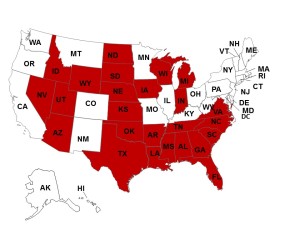“It may benefit employers not to negotiate with employees and to pay less, but that’s different from saying this is going to help a state’s economic development.”
 Republicans tout anti-union laws as a way to attract businesses and jobs. But it doesn’t work that way in real life. North Carolina, a long-time bastion of so-called “right to work” legislation, has lost half its manufacturing jobs in just two decades. Oklahoma, another one, also saw its manufacturing economy gutted after passing a RTW law.
Republicans tout anti-union laws as a way to attract businesses and jobs. But it doesn’t work that way in real life. North Carolina, a long-time bastion of so-called “right to work” legislation, has lost half its manufacturing jobs in just two decades. Oklahoma, another one, also saw its manufacturing economy gutted after passing a RTW law.
Mr. Lafer says RTW laws backfire. By lowering incomes and living standards, people have less disposable income, which hurts small businesses rooted in communities and unable to easily move like big companies can. “In addition to lower wages,” Lafer says, “people in right-to-work states are less likely to have employer-provided health care,” which further erodes discretionary purchasing power.
(Click here for complete story.)
This is something that has always mystified me. Wages are an expense for companies, but workers are their customers. They may save money by paying lower wages and less benefits, but then their customers are less able to buy goods and services from them. Ultimately, by pushing down wages, companies put themselves out of business. And even though companies may be attracted by low wages, why would workers want to live in those states? Wouldn’t you expect them to move to areas where employers offer better wages?
Logic argues that “right to work for less” laws, as labor activists call them, and other strategies to reduce wages,* are in fact a prescription for economic stagnation and worker flight. Look at the map above (RTW states are colored red) and ask yourself, which states are thriving and attracting population, and which ones are economic backwaters that young people, in particular, are leaving for better opportunities elsewhere?
* “Right to work” laws are often combined with other measures to force people to accept extremely low-paying jobs, such as denying welfare benefits and food stamps to people who don’t satisfy “work requirements” (which, in practice, means accepting dirty, dangerous, degrading, and low-paying work) and even threatening unemployed fathers who owe child support with jail if they don’t accept such jobs. Thus, RTW shouldn’t be viewed as merely a standalone effort to break unions, but as part of a broader strategy by conservative ideologues to restore 19th century labor conditions and coerce workers into bad employments they wouldn’t accept by choice — the modern equivalent of slavery.